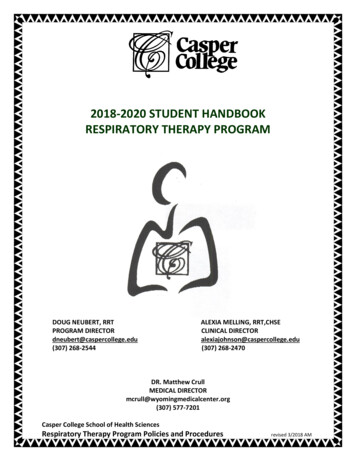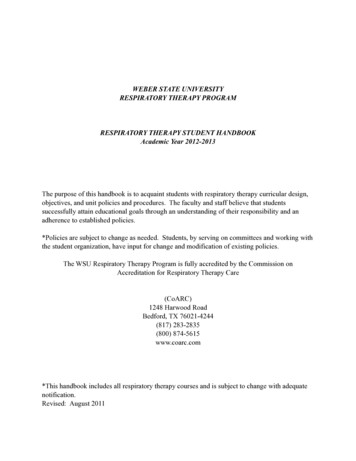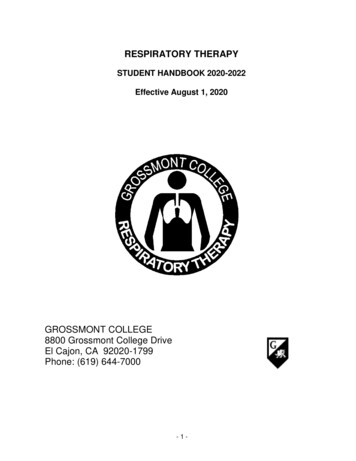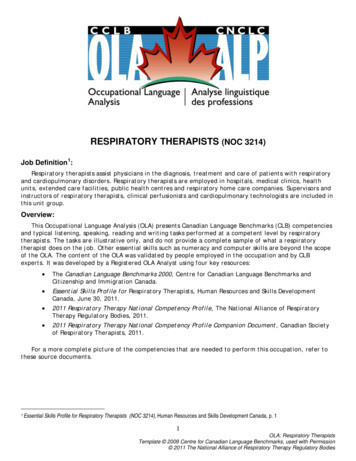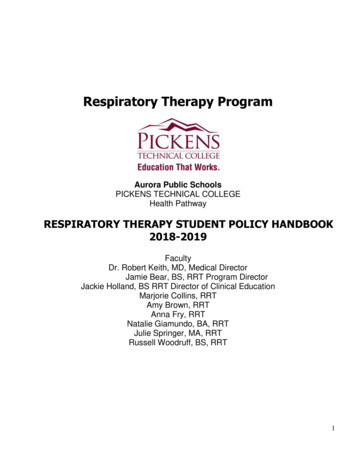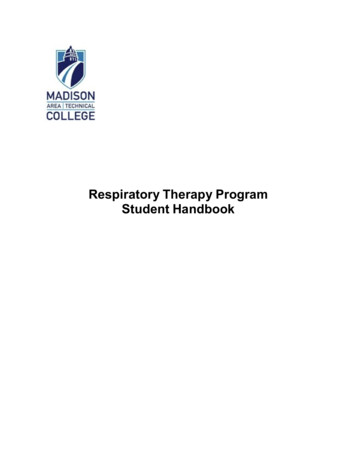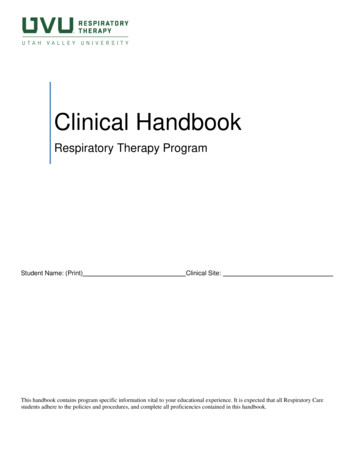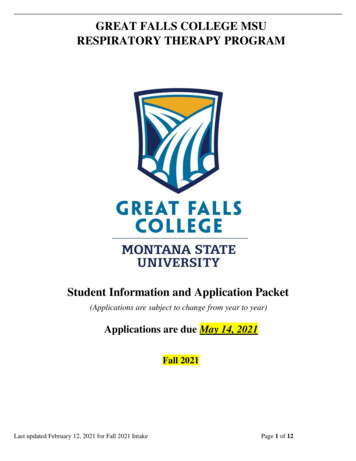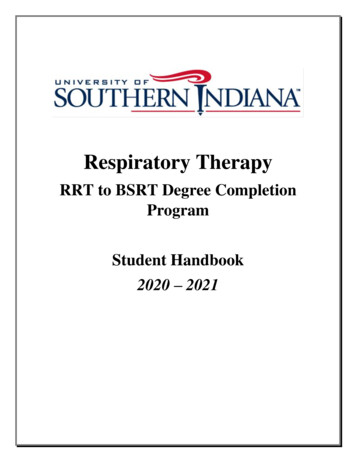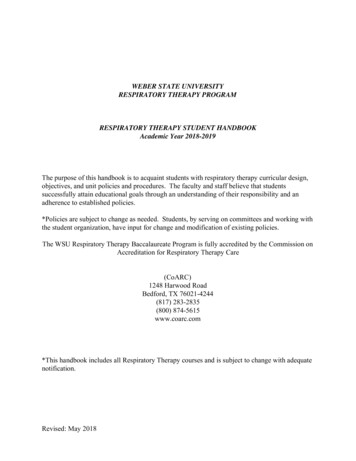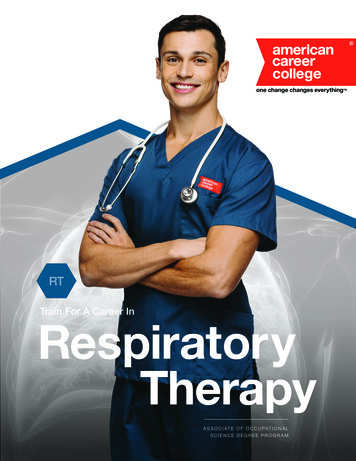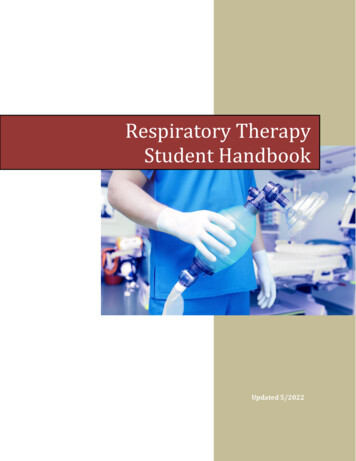
Transcription
Respiratory TherapyStudent HandbookUpdated 5/2022Respiratory Therapy1Approved3/2018StudentHandbook
TABLE OF CONTENTSWELCOME. 5CONTACT INFORMATION . 6ACCREDITATION . 7MT. SAN ANTONIO COLLEGE MISSION, VISION, AND CORE VALUES . 8MISSION STATEMENT . 8VISION STATEMENT . 8CORE VALUES . 8RESPIRATORY THERAPY PROGRAM . 9HISTORY . 9EDUCATIONAL PHILOSOPHY . 9GOAL . 9ORGANIZATION . 10EMPLOYMENT OF RESPIRATORY THERAPISTS . 11RESPIRATORY THERAPY PROGRAM EXPECTATIONS . 12RESPIRATORY THERAPY AS DEGREE CATALOG INFORMATION . 13OVERVIEW . 13Required Courses . 14ADMISSION . 14Entrance Requirements . 14Physical Demands . 15Sensory Demands . 15Working Environment . 15English Language Skills . 16Other Requirements . 16A.S. Degree Requirement . 16Special Information . 16Readmission Policy . 16ADDITIONAL PROGRAM INFORMATION. 16EDUCATIONAL PLAN . 16VARIANCES . 17PROGRAM UNITS PER SEMESTER . 17GRADING CRITERIA. 17LABORATORY AND CLINICAL COURSE EXAMS . 17COST . 18STATEMENT OF ACCOMMODATIONS . 19GRADUATION REQUIREMENTS . 19Associate Degree Requirement . 19Application for Graduation. 19AFTER GRADUATION . 19CREDENTIALING . 19LICENSURE . 20BACCALAUREATE DEGREE . 20RESPIRATORY THERAPY PROGRAM POLICIES . 20COMMUNICATION . 20CONTACT INFORMATION . 20CLASSROOM CONDUCT. 20Respiratory TherapyStudent Handbook2
CELLULAR PHONES AND OTHER MOBILE DEVICES. 21RECORDING DEVICES . 21DRESS CODE . 21Laboratory . 21Classroom . 21Clinical . 21SOCIAL MEDIA POLICY . 21ATTENDANCE POLICY . 22ZOOM CLASSROOM ETIQUETTE . 22CHILDREN . 23GIFTS . 23CLINIC POLICIES AND REQUIREMENTS . 23CLINIC MANUAL . 24ASSIGNMENTS . 24STUDENT HEALTH STATUS . 24REQUIRED CLINICAL DOCUMENTATION . 24REQUIRED CERTIFICATIONS . 25Basic Life Support (BLS) Certification. 25Advanced Cardiac Life Support (ACLS) Certification . 25Neonatal Resuscitation Program (NRP) Certification . 25Pediatric Advanced Life Support (PALS) Certification . 25DISCIPLINARY ACTION POLICY . 25INDICATIONS FOR PROBATION . 25INDICATIONS FOR DISMISSAL . 26MT. SAN ANTONIO COLLEGE ACADEMIC POLICIES . 26PROHIBITION OF UNLAWFUL DISCRIMINATION . 26PROHIBITION OF HARRASSMENT . 27SEXUAL MISCONDUCT, DATING VIOLENCE, DOMESTIC VIOLENCE, AND STALKING . 27ACADEMIC HONESTY . 27STANDARDS OF CONDUCT . 28DROPPING COURSES AND WITHDRAWING FROM THE COLLEGE . 30Full 16-week courses . 30Intersessions and other short term classes . 30STUDENT COMPLAINTS/ GRIEVANCE PROCESS . 31APPEALS PROCESS . 31TECHNOLOGY AND HEALTH DIVISION SERVICES . 32HEALTH CAREERS RESOURCE CENTER . 32TECH ED RESOURCE CENTER (TERC) . 32MT. SAN ANTONIO COLLEGE STUDENT SUPPORT SERVICES . 33ACADEMIC SUPPORT AND ACHIEVEMENT CENTER (ASAC) . 33ACCESSIBILITY RESOURCE CENTERS FOR STUDENTS (ACCESS). 33CHILD DEVELOPMENT CENTER . 33CAREER & TRANSFER SERVICES . 33COMPUTER AND INTERNET ACCESS LEARNING LAB . 34COMMUNITY EDUCATION . 34COUNSELING SERVICES . 34EXTENDED OPPORTUNITY PROGRAMS AND SERVICES (EOPS). 34FINANCIAL AID . 35LIBRARY . 35SACBOOKRAC. 35Respiratory TherapyStudent Handbook3
SCHOLARSHIP PROGRAM OFFICE . 35STUDENT HEALTH SERVICES. 36THE WRITING CENTER . 36PROFESSIONAL ORGANIZATIONS . 37AMERICAN ASSOCIATION FOR RESPIRATORY CARE . 37CALIFORNIA SOCIETY FOR RESPIRATORY CARE . 37AMERICAN ASSOCIATION FOR RESPIRATORY CARE POSITION STATEMENTS . 38AARC STATEMENT OF ETHICS AND PROFESSIONAL CONDUCT . 38AARC STATEMENT ON CULTURAL DIVERSITY . 39MT. SAN ANTONIO COLLEGE RESPIRATORY THERAPY PROGRAM HANDBOOK AGREEMENT . 40Respiratory TherapyStudent Handbook4
WelcomeWelcome to the Mt. San Antonio College (Mt. SAC)Respiratory Therapy Associate Degree Program! You areabout to embark on a very exciting and challenging programdesigned to prepare you to become a Respiratory Therapistand pass the National Board for Respiratory Care (NBRC)credentialing examinations. We are very proud of the programand the achievements of our graduates.Respiratory Therapists are specialized healthcare practitioners who help educate,diagnose, and treat people suffering from lung and heart conditions. RespiratoryTherapists use their knowledge of anatomy, physiology, pathophysiology, microbiology,physics, and patient assessment to provide patient care.The course of study in Respiratory Therapy offered at Mt. SAC and its affiliate hospitalswill prepare you to become a skilled and knowledgeable Respiratory Therapist able tomeet the needs of our diverse community. Students will be prepared to work with patientsin the treatment, management and control of diseases and abnormalities associated withthe cardiopulmonary system. Students work closely with patients, doctors, nurses, andother allied health professionals to provide diagnostic testing, therapeutics, education,rehabilitation, monitoring, life support and other specialized treatments.This handbook details program guidelines, procedures, and policies and is a supplementto the Mt. SAC Catalog, Mt. SAC Student Handbook, and Mt. SAC Schedule of Classes.Program academic policies apply equally to all students and faculty (CoARC Standard1.06). We expect you to become familiar with all Mt. SAC and Respiratory TherapyProgram policies. These policies encompass program requirements the professional,clinical and academic behaviors expected of you during the program. Taking the time tobecome familiar with and understand the content of this handbook is your responsibility.The Respiratory Therapy Program requires much time and dedication on your part. Theacademic challenges of the next 22 months are extremely rigorous but with an activecommitment on your part, you will find your education enjoyable and rewarding. Yourcommitment to your patients begins today as you commit yourself to understanding theinformation and practicing the skills needed to become a skilled and knowledgableRespiratory Therapist.Be proud of what you do, be proud of your school and enjoy this time of personal growth.Welcome!Respiratory TherapyStudent Handbook5
Contact InformationKelly Coreas – Program Director909-274-4721kcoreas@mtsac.eduBuilding 67A, Room 139Mary Rose Wiesner – Department Chair909-274-4722mwiesner@mtsac.eduBuilding 67A, Room 129Jim Hutchinson – Director of Clinical Education909-274-3636jhutchinson@mtsac.eduBuilding 67A, Room 143Adjunct FacultyGwendolyn Butler gbutler5@mtsac.eduJohn Garcia jgarcia616@mtsac.eduMichael Haines mhaines1@mtsac.eduIrina Vartapetian ivartapetian@mtsac.eduSam Agdasi – Health and Technology Division Dean909-274-4750Earl Young, MD – Medical Director50 Bellefontaine St, Ste 206 Pasadena, CA 91105Melissa Villegas – Admin909-274-3636TechAndHealth@mtsac.eduBuilding 67A, Room 145Respiratory TherapyStudent Handbook6
AccreditationMt. San Antonio College is accredited by the:Accrediting Commission for Community and Junior CollegesWestern Association of Schools and Colleges331 J Street, Suite 200Sacramento, CA 95814(415) 506-0234www.accjc.orgaccjc@accjc.orgThe Accrediting Commission for Community and Junior Colleges Western Association ofSchools and Colleges is an institutional accrediting body recognized by the Council forHigher Education Accreditation and the U.S. Department of Education.The Respiratory Therapy Program is accredited by:The Commission on Accreditation for Respiratory Care264 Precision Blvd.Telford, TN 34690817-283-2835www.coarc.comCoARC accredits respiratory therapy education programs in the United States. Toachieve this end, it utilizes an ‘outcomes based’ process. Programmatic outcomes areperformance indicators that reflect the extent to which the educational goals of theprogram are achieved and by which program effectiveness is documented (CoARCStandard 5.03).Programmatic Outcomes mes-data/Respiratory TherapyStudent Handbook7
Mt. San Antonio College Mission, Vision, and Core ValuesMission StatementThe mission of Mt. San Antonio College is to support all students in achieving theireducational goals in an environment of academic excellence. Specifically, the College iscommitted to providing quality education, services, and workforce training so thatstudents become productive members of a diverse, sustainable, global society. TheCollege pledges to prepare students for lifelong learning through the mastery of basicskills, the achievement of associate degrees and certificates, and the completion of careerand transfer pathways. The College will carry out this commitment by providing anengaging and supportive teaching and learning environment for students of diverseorigins, experiences, needs, abilities, and goals. The College is dedicated to serving ourcommunity through improving economic achievement, advancing civic engagement,enhancing personal well-being, promoting critical thinking, and enriching aesthetic andcultural experiences.Vision StatementMt. San Antonio College strives to be regarded as one of the premier community collegesin the nation. We will be viewed as a leader in community college teaching, programs,and services. As a premier community college, we will provide access to qualityeducational programs and services, focusing on student success within a climate ofintegrity and respect. We will earn this reputation by consistently exceeding theexpectations of our students, our staff, and our community.Core Values Integrity: We treat each other honestly, ethically, and respectfully in an atmosphereof trust.Equity and Diversity: We respect and welcome all differences, and we foster equalopportunity to succeed throughout the campus community.Community Building: We work in responsible partnerships through opencommunication, caring, and a cooperative spirit.Student Focus: We address the needs of students and the community both in ourplanning and in our actions.Lifelong Learning: We promote the continuing pursuit of high educational goalsthrough equal access to excellence in both teaching and support services.Positive Spirit: We work harmoniously, show compassion, and take pride in our work.Effective Stewardship: We sustain and improve the institution and environment byefficiently using resources of time, talent, facilities, and funding.Respiratory TherapyStudent Handbook8
Respiratory Therapy ProgramHistoryThe Respiratory Therapy Program at Mt. San Antonio College was the first Respiratory Caretraining program in the state of California. It began in 1963 as a one-year certificate program.In response to the demand for a more intensified course of study for Respiratory TherapyTechnicians, the College added a two-year Associate degree program in 1965.Educational PhilosophyThe role of the faculty in the Mt. San Antonio College Respiratory Therapy Program is tobe facilitators of student learning. Teaching is an interactive process that enhanceslearning for the student. The instructor provides the learner with resources, integrity, andguidance to facilitate learning and the student is expected to be an active participant inthe teaching-learning process and is accountable for his or her own learning.GoalTo prepare graduates with demonstrated competence in the cognitive (knowledge),psychomotor (skills), and affective (behavior) learning domains of respiratory carepractice as performed by registered respiratory therapists (RRTs) (CoARC Standard3.01).Respiratory TherapyStudent Handbook9
OrganizationCollege PresidentDr. William T. ScrogginsVice President of InstructionKelly FowlerDean, Technology & HealthSam AgdasiRespiratory Care Department ChairMary-Rose WiesnerRespiratory Care Program DirectorKelly CoreasProgram SecretaryMelissa VillegasMedical DirectorDr. Earl YoungRespiratory CareDirector of Clinical EducationJames HutchinsonClinical FacultyGewndolyn ButlerJohn GarciaNicole GraffeoMichael HainesIrina VartapitianFull- and Part- TimeDidactic/Laboratory FacultyJohn GarciaProgramAdvisory CommitteeStudentsGraduatesFacultyCollege AdministrationOther piratory TherapyStudent Handbook10
Employment of Respiratory TherapistsEmployment of respiratory therapists is projected to grow 23% (much faster than average)from 2020 to 2030, faster than the average for all occupations. About 10,100 openingsfor respiratory therapists are projected each year, on average, over the next decade.Growth in the middle-aged and elderly population will lead to an increased incidence ofrespiratory conditions such as pneumonia, chronic obstructive pulmonary disease(COPD), and other disorders that can permanently damage the lungs or restrict lungfunction. The aging population will in turn lead to an increased demand for respiratorytherapy services and treatments, mostly in hospitals.In addition, a growing emphasis on reducing readmissions in hospitals may result in moredemand for respiratory therapists in nursing homes and in doctors’ offices.Advances in preventing and detecting disease, improved medications, and moresophisticated treatments will also increase the demand for respiratory therapists. Otherconditions affecting the general population, such as respiratory problems due to smokingand air pollution, along with respiratory emergencies, will continue to create demand forrespiratory therapists.Most—about 80%— respiratory therapists work in hospitals. Others work in skillednursing facilities and physicians’ offices. Most respiratory therapists work full time, inmedical facilities, such as hospitals that operate 24 hours a day, 7 day a week.Respiratory therapists generally work 12-hour shifts and work days, nights, weekendsand holidays.In the state of California the average hourly wage is 44.55 and the average annual wageis 92,660. Job prospects will be best for therapists willing to travel to look for jobopportunities. Some areas will be saturated with workers, while other areas (more often,rural areas) will be in need of respiratory therapists’ services.United States Department of Labor Bureau of Labor ratory-therapists.htmand ccessed 4/2022)Respiratory TherapyStudent Handbook11
Respiratory Therapy Program ExpectationsThe expectations of students enrolled in the Respiratory Therapy Program at Mt. SanAntonio College are as follows: Commitment: Students are expected to dedicate the time and energy necessary tosuccessfully complete all academic assignments and projects, to learn what is requiredto become a competent respiratory therapist, and to achieve the goals of the program.Students will need to spend time outside the classroom, reading, studying andpracticing procedures in both the Respiratory Therapy Lab and Health CareersResource Center Lab. Students are expected to keep up with assignments this willrequire time outside of class and lab spent with the instructors during office hours andopen lab hours. Expect 2 to 3 hours of homework per each class hour. Most of thistime is in the form of reading assignments and answering learning objectives. Personal Responsibility: Students are expected to keep track of their own grades andprogress in the program. At any time or on any assignment, if the student earns agrade of less than C, the student is expected to see the instructor responsible for thecourse within one week. Students who do not obtain a grade of C or higher on anyassignment or test will be required to meet with the course instructor for remediation anddevelopment of an action plan within one week of receiving the grade. Attendance: Students are required to attend all scheduled respiratory therapy class,laboratory, and clinical sessions. Our purpose is to prepare the students for theworkforce. There is a direct correlation between class attendance, productivity, andsuccess on the job after graduation. The student’s grade will be affected by attendance. Professional Demeanor: Students are expected to project a professional imageincluding appearance, confidence, respect, courtesy, self-control, initiative,dependability and reliability, honesty, punctuality, and responsibility. Ethical Concern: Students are expected to consider foremost the well-being and safetyof their patients, to obey all pertinent laws and regulations, and to abide by the AmericanAssociation for Respiratory Code of Ethics. Academic Competency: Students are expected to master each major subject in thecurriculum. To assure competency, it is imperative that each respiratory therapy studentstrive to demonstrate a satisfactory level of performance on each examination and oneach major project, paper, or other method of evaluation that is administered by thefaculty. See each course syllabus for specific details Communicate Clearly: Students are expected to apply appropriate writing, speaking,and listening skills in order to precisely convey information, ideas, and opinions.Students are required and expected to communicate with program faculty on a regularbasis. Work Cooperatively: Students are expected to demonstrate the ability to work withothers to complete tasks, solve problems, and offer support.Respiratory TherapyStudent Handbook12
Respiratory Therapy AS Degree Catalog InformationOverviewThe Respiratory Therapy Program, which is accredited by the Commission onAccreditation for Respiratory Care (COARC), is designed to train students to function asRespiratory Therapists.Respiratory Therapy is the application of technical skills involving a completeunderstanding of cardiopulmonary physiology and recognition of various pathologicalconditions that alter the patient’s ability to breathe effectively.By applying medical gases under pressure - i.e., compressed air, oxygen, and othermixtures - to the airways through the use of various kinds of equipment, the therapist,under the direction of the physician, treats the diseased or ineffective respiratorysystem.Some mechanical aptitude and the ability to perform fine motor movements with handsand fingers is required in learning the operation of specialized equipment. This includesdiagnostic apparatus which aids the physician in detecting cardiorespiratory diseases.Respiratory TherapyStudent Handbook13
This degree requires the completion of General Education coursework plus thefollowing:Required CoursesFall First Year (16 week semester)RESD 102 Theory & Principles of Respiratory
Respiratory Therapy Student Handbook 1 . Approved 3/2018 . Respiratory Therapy Student Handbook Updated 5/2022
